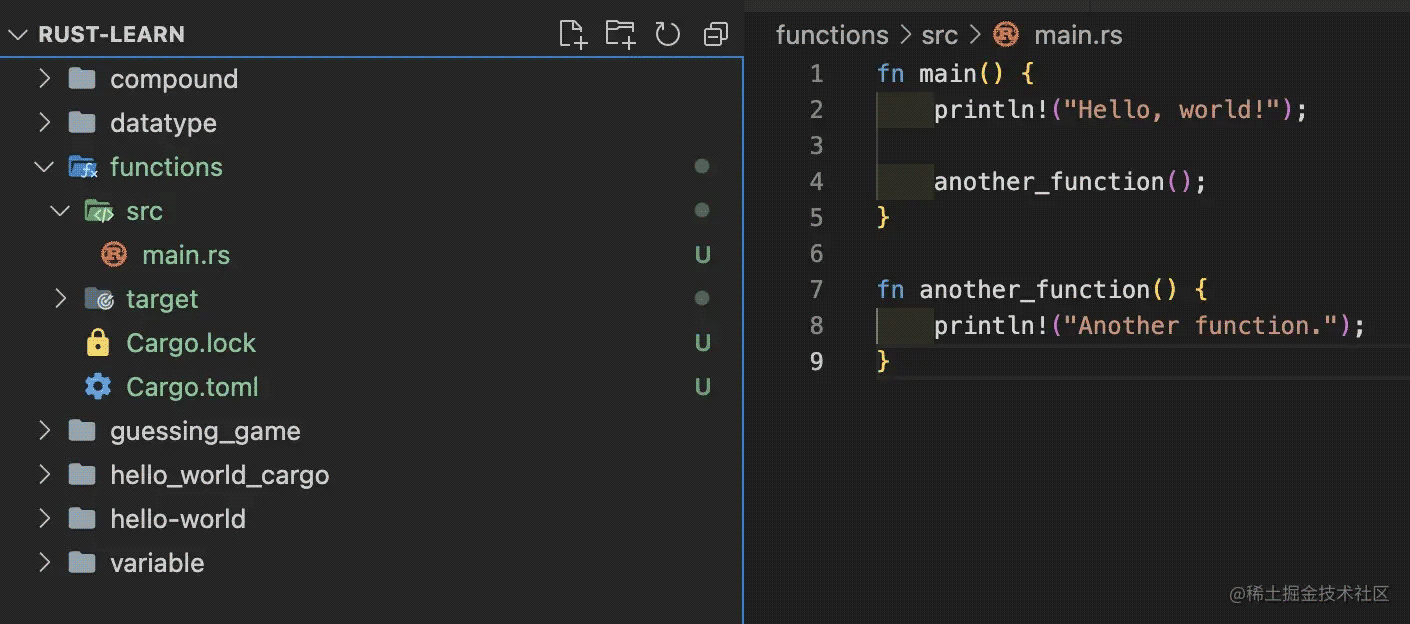Rust 函数注释
ag9920 人气:0写在前面
今天我们来学习 Rust 中的函数,最后会捎带介绍一下如何在 Rust 中写注释。也是比较轻量级的一节,大家快速过一下即可。
函数
函数本身是各个语言都支持的类型,我们此前已经多次使用 fn main() 这个函数来承载业务逻辑,fn 可以用来声明一个函数,而 main 函数跟其他语言一样,可以理解为程序启动的【起点】,一切逻辑从这里开始。
Rust 本身的命名规范是【snake case】,即下划线 + 小写,这个其实各个语言都有自己规范,分清楚环境即可。
fn main() {
println!("Hello, world!");
another_function();
}
fn another_function() {
println!("Another function.");
}
这里的 another_function 就是个没有入参,没有出参的函数,命名遵循 snake case,很好理解。
Rust 中的函数跟其他语言是一样的,用 fn 来声明,后面加上函数名,小括号里面可以放入参,之后可以定义出参,最后用花括号来承载函数体。调用函数也不复杂,函数名后面跟上小括号+参数即可,注意 scope 就行,这里是因为我们的 another_function 就在当前包下,所以直接就那来调用。调用的时候要保证【函数所在的 scope 是对 caller 可见】的即可。
我们在 rust-learn 项目下通过 cargo new functions 新建一个项目,试一下上面的代码:

$ cargo run
===============================
Compiling functions v0.1.0 (/Users/ag9920/go/src/github.com/ag9920/rust-learn/functions)
Finished dev [unoptimized + debuginfo] target(s) in 1.76s
Running `target/debug/functions`
Hello, world!
Another function.
另外需要强调一点,Rust 文件内函数定义并不要求顺序,只要定义在 scope 内就能解析,比如 main 函数先于 another_function 定义是没问题的。
参数
还是基于我们此前的 another_function,我们尝试加一下入参,看看应该怎么做:
fn main() {
another_function(5);
}
fn another_function(x: i32) {
println!("The value of x is: {x}");
}
执行过后,结果如下:
$ cargo run
===============================
Compiling functions v0.1.0 (/Users/ag9920/go/src/github.com/ag9920/rust-learn/functions)
Finished dev [unoptimized + debuginfo] target(s) in 0.62s
Running `target/debug/functions`
The value of x is: 5
此时 another_function 增加了一个参数 x,我们声明其类型为 i32。在 main 函数中调用的时候,传入我们的参数 5,最后被打印出来。
可能有的地方会特意提一下这两个概念:
- 形参:是在定义函数时使用的参数,目的是用来接收调用该函数时传进来的实际参数,即 parameter;
- 实参:是在调用时传递给函数的参数,即 arguments。
但通常说起来的时候我们不太区分,对我们来说统一叫【参数】即可。
上面示例中,我们定义入参是这样的:fn another_function(x: i32)。
这里【冒号 + 空格 + 类型】的写法我们已经见过很多次了,那能不能不带类型呢?我直接写个 fn another_function(x),具体格式留给编译器来推断 ok 不?
在 Rust 中这件事是不 ok的,按照规范,对于每个入参你都必须清晰地指明【类型】,这样编译器也省事,报错时也能更精准给出相关判断。如果我们需要多个入参,用【逗号】分隔即可:
fn main() {
print_labeled_measurement(5, 'h');
}
fn print_labeled_measurement(value: i32, unit_label: char) {
println!("The measurement is: {value}{unit_label}");
}
执行结果如下:
$ cargo run
========================
Compiling functions v0.1.0 (/Users/ag9920/go/src/github.com/ag9920/rust-learn/functions)
Finished dev [unoptimized + debuginfo] target(s) in 0.87s
Running `target/debug/functions`
The measurement is: 5h
语句和表达式
Rust 本身是一个基于表达式的语言,所以这两个概念我们先区分一下,语句(statements),表达式(expressions)是什么区别?
Statements are instructions that perform some action and do not return a value. Expressions evaluate to a resulting value.
简单说,就是看有没有【返回值】,无返回值的是语句,有返回值的是表达式,表达式可以是一个语句的组成部分。
举个例子:let y = 6; 这就是一个【语句】,而 6 就是一个【表达式】,在 Rust 中你是不能做 let x = (let y = 6); 这样的操作的,因为括号里面的部分是个语句,语句没有返回值,那么该拿什么给 x 赋值呢?
所以,不像其他语言,可能允许类似 x = y = 6,这样让 x 和 y 都赋值了 6。Rust 是不允许这样的。
fn main() {
let y = {
let x = 3;
x + 1
};
println!("The value of y is: {y}");
}
比如上面这个案例,在花括号这个 scope 中,我们定义了 x 变量,将其赋值为 3,然后将 x+1 这个表达式返回,所以 y 被赋值为 4。
花括号里面的部分就是一个表达式,返回了 4 。注意 x + 1 的结尾没有分号,这也是表达式的特征。这里千万不能加分号,要想清楚。如果你想用一个表达式返回,就不加分号。加了之后变成了语句,但也不会返回什么东西。
Rust 函数体则是由一系列【语句】+ 默认可选的一个【表达式】组成。为什么是可选的?因为类似我们前面的函数,没有返回值,不需要最后的这个【表达式】。
返回值
Rust 是不支持命名返回值的(这一点跟 Golang 有所不同),函数定义出参的部分需要用【箭头符号】显式地声明。
不像很多函数要求显式的 return 返回值,Rust 默认会返回最后的表达式的值。当然我们如果想 early return 也是 ok的,但大多数函数不会写 return 这个关键字,而是隐式地返回最后一个表达式。我们来看一个例子:
fn five() -> i32 {
5
}
fn main() {
let x = five();
println!("The value of x is: {x}");
}
这里的 five 函数非常简单,只有一个 5 作为表达式返回,不需要 return。
这是完全合法的 Rust 函数,出参只有一个 i32。我们加上入参,再看一个例子:
fn main() {
let x = plus_one(5);
println!("The value of x is: {x}");
}
fn plus_one(x: i32) -> i32 {
x + 1
}
此时我们有一个 i32 入参,也有一个 i32 出参,函数体是一个简单的表达式 x + 1。运行上面代码打印的结果是 The value of x is: 6,符合预期。
我们试试给 x + 1 后面加上个分号看看:
fn main() {
let x = plus_one(5);
println!("The value of x is: {x}");
}
fn plus_one(x: i32) -> i32 {
x + 1;
}
此时运行结果果然报错(这个不是运行时报错,是编译阶段识别的)
$ cargo run
====================
Compiling functions v0.1.0 (/Users/ag9920/go/src/github.com/ag9920/rust-learn/functions)
error[E0308]: mismatched types
--> src/main.rs:7:24
|
7 | fn plus_one(x: i32) -> i32 {
| -------- ^^^ expected `i32`, found `()`
| |
| implicitly returns `()` as its body has no tail or `return` expression
8 | x + 1;
| - help: remove this semicolon
For more information about this error, try `rustc --explain E0308`.
error: could not compile `functions` due to previous error
问题在于,plus_one 说了会有返回值 i32,但到最后也没发现【表达式】,此时 Rust 默认会返回 () 一个空的 tuple(我们上一节讲过,这个叫 unit),所以报错叫做【 mismatched types】,而不是类似【no return value】,这里是不是就理解了?
没有返回值的函数,本质上是返回了一个 unit:
// Functions that "don't" return a value, actually return the unit type `()`
fn fizzbuzz(n: u32) -> () {
if is_divisible_by(n, 15) {
println!("fizzbuzz");
} else if is_divisible_by(n, 3) {
println!("fizz");
} else if is_divisible_by(n, 5) {
println!("buzz");
} else {
println!("{}", n);
}
}
问题又来了,那 Rust 能不能支持多个出参呢?类似 Golang 中的:
func addsub(x, y int) (int, int) {
return x + y, x - y
}
其实 Rust 对这个事情的解决方案就是我们已经见过多次的 tuple:
fn addsub(x: isize, y: isize) -> (isize, isize) {
(x + y, x - y)
}
fn my_func() -> (u8, bool) {
(1, true)
}
圆括号千万不能少,记住我们 return 的是个 tuple,不是多个单独的值。
这里有一个可运行的 online 示例,大家可以复习一下 tuple,结合多个返回值体会一下:
fn swap(x: i32, y: i32) -> (i32, i32) {
return (y, x);
}
fn main() {
// return a tuple of return values
let result = swap(123, 321);
println!("{} {}", result.0, result.1);
// destructure the tuple into two variables names
let (a, b) = swap(result.0, result.1);
println!("{} {}", a, b);
}
注释
注释其实比较简单,我们快速提一下。
Rust 的行注释就是常见的 // 双斜杠,如果一行放不下,需要多行的话,也需要在每一行前面加.
fn main() {
// I'm feeling lucky today
let lucky_number = 7;
}
文档注释有些许的区别,这里需要用 /// 三斜杠,这样能够辅助生成 HTML 文档。
/// Adds one to the number given.
///
/// # Examples
///
/// ```
/// let arg = 5;
/// let answer = my_crate::add_one(arg);
///
/// assert_eq!(6, answer);
/// ```
pub fn add_one(x: i32) -> i32 {
x + 1
}加载全部内容